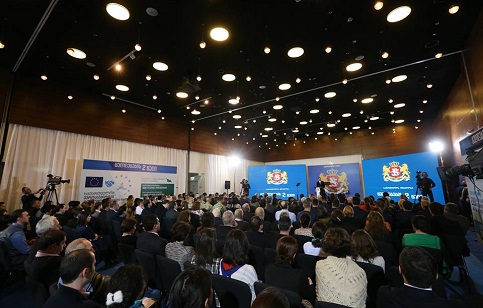PM Garibashvili offers autonomy within Georgia to Abkhazians and Ossetians

Georgia’s Prime Minister Irakli Garibashvili is offering a "broad autonomy” within the "united, sovereign and independent Georgia” to the people living on Georgia’s Russian-occupied regions.
Read the economic part of the PM's speech here.
Read the social part of the PM’s speech here.
During his speech today that summarised the past two years, Garibashvili said creating a new, independent state on the territory of other sovereign state was a "utopian plan”, which would never come true and would never be tolerated by Georgia’s current Government or its future generation.
"You cannot be happy without us and we cannot be happy without you,” the PM addressed Abkhazians and South Ossetians.
"We really want to restore trust between us. We shared a difficult past full of very bad mistakes but today we live in the 21st Century and we offer you to live in a united and strong Georgia.”
Garibashvili congratulated the Abkhaz people on the Abkhazian Language Day and said they only could maintain their language and culture within Georgia, which had a European future.
The PM reminded Abkhazians and Ossetians that they used to be autonomous republics on Georgian territory.
"And we are offering you the same – you will have your autonomy within a united, independent, strong Georgia and we will live peacefully together,” Garibahsvili said, adding this was "one more brotherly and friendly offer”.
Russia recently offered breakaway Abkhazia an agreement on "Alliance and Integration”, which was assessed as a violation of international law by Georgia and the global community. The Georgian Government said it would develop a unified action plan to ensure the best solution was found to rectify this issue.
Abkhazia and Tskhinvali region (so-called South Ossetia) are Georgia’s two breakaway regions currently controlled by Russian-backed separatists. The regions were recognised as an independent by four states - Russia, Nicaragua, Venezuela and Nauru, while the global community including international organisations such as the European Union, North Atlantic Treaty Organisation and the United Nations considered the regions to be part of Georgia.
 Tweet
Tweet  Share
Share